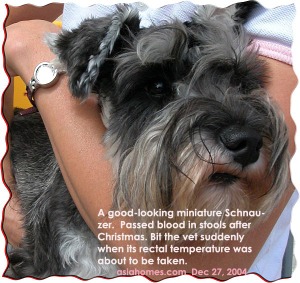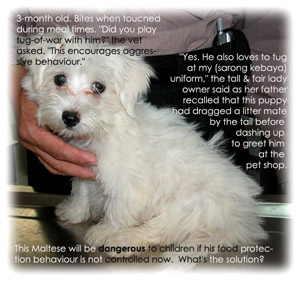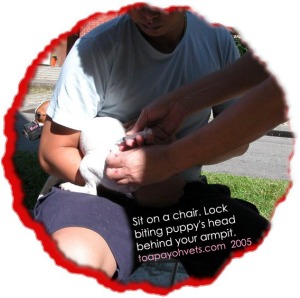 "I
forgot to tell you," the owner said to the
vet who got a quick nip on his hand from her Miniature Schnauzer. "My dog
bites." "I
forgot to tell you," the owner said to the
vet who got a quick nip on his hand from her Miniature Schnauzer. "My dog
bites."
Socialisation (interaction with other dogs, people and environment)
is important for puppies to prevent abnormal behavioural problems
like aggression towards some family members, friends or other dogs,
biting children and being afraid of traffic noises.
It is important to start early as the puppy grows up rapidly.
I
recommend from 6 weeks of age to socialise the puppy with
people including children and the environment. In most cases, this
is not possible because:
*Some breeders don't sell their puppies, especially Chihuahuas,
mini-Malteses and Yorkshire Terriers till they are over 10 - 12 weeks of
age as the new owners will not know how to care for them.
*Vaccination regulations prohibit the sale of puppies till they have
two vaccinations said to be four weeks apart. In busy pet shops,
such puppies do meet people but not interact with other puppies.
*Pet shop operators advise that puppies should be isolated from
other dogs and kept at home till they receive 3 vaccinations.
This is to prevent them from being infected by the deadly parvoviral
disease which is common in Singapore.
*Some pet shop operators report that the puppy must receive 2
vaccinations and wait another 4 weeks before they can be sold. The
2nd and 3rd vaccinations are recommended to be four weeks apart. If the first
vaccination is at 6 weeks of age, the puppy will be at least 14
weeks old before they meet with other dogs.
 Advices: Advices:
Take the puppy out to areas where no other dogs meet. Go for car
rides to get it used to travelling.
Avoid dog parks and areas where there are dog faeces. If your
friend's dog is properly vaccinated and healthy, it is all right to
meet with the other dog. If one of your dogs is going to see the
veterinarian, don't bring the puppy along as the veterinary premises
may or may not have some viral diseases.
One week after the 3rd vaccination, bring him out to dog-friendly places and eating areas like outdoor
food courts so that he will meet other people, get used to traffic
noises and not be anxious or
afraid of them. Keep him under leash and proper supervision.
AGGRESSIVE BEHAVIOUR
TO DISCOURAGE BITING
1.
PLAYING TUG-OF-WAR. Don't play tug-of-war games with your
puppy. It is fun to pull ropes or clothes from the puppy's
mouth but it encourages aggressive behaviour in some puppies. Give
it chew toys or spend more time exercising it.
6.2 FOOD PROTECTION.
The puppy bites when you touch him while he is eating or you take
away his feed bowl. Say "No biting," firmly when the puppy is
protective about its feed bowl. Reward him only when he does
 not
bite during feeding. Do not snatch the feed bowl away from him as if
you are playing with him in a tug-of-war. not
bite during feeding. Do not snatch the feed bowl away from him as if
you are playing with him in a tug-of-war.
6.3 GROWLING. When your puppy growls, don't reward this
behaviour by comforting him. Ignore him. When he is
quiet, reward him with a treat or praise.
6.4 MOUTHING OWNERS. Puppies are teething and may chew
on your fingers. Pull your hand back and say "No!" loudly.
Mouthing is a way of communication like hand shaking in people. But
discourage such behaviour with a firm "No biting" by stopping all
play with the puppy for 10 minutes. Reward him when he does not
bite.
6.5 JUMPING UP TO NIP
YOUR FINGERS. Step back one step when your puppy jumps at you.
Ignore the puppy till he settles down. This is to discourage such
potential aggressive behaviour.
6.6. BODY LANGAUAGE. Recognise your dog's signs of an
aggressive behaviour. These are low growling, eyes staring at
you, raised ears and everted lips, and hairs standing out from the
neck and back. If you don't recognise these signs, the puppy
will bite.
6.7 Teach your puppy that people are potential sources
for treats. Involve all family members, including younger children,
in the training of your puppy and dispensing treats.
dispensing treats.
6.8 Socialise your puppy early. Get it is used to
petting on the head as a fun experience rather than a threat.
6.9
GROOMING DAILY. Handle its eyes, ears, tail, backside and body
during your daily grooming so that it is not frightened when you
visit the veterinarian who may need to take its rectal temperature
to check for fever. Few owners check the anal and the
female and male private parts. Sometimes there are dried up
stools and infected matted hairs in these areas. It is important that you inspect these areas so
that the puppy is kept in the best of health and used to grooming.
6.10 SAFETY OF PEOPLE. Muzzle your aggressive dog when you
bring it to the veterinary surgery if he bites. He may bite
other dogs or people at the surgery. For injection of very
aggressive puppies, a strong owner can sit on a chair and lock the
puppy's behind his armpit to permit safe injection.
6.11 EXTRACTION OF THE FANGS. There have been the rare
requests to extract the canine teeth or flattening the sharp tips of
the canine teeth to prevent aggressive biting of aged parents. Such
requests are not granted as neutering the male dog at 6 months of
age and training at a young age will help to reduce aggression.
6.12 Consult dog trainers and animal behaviourists
specialising in dog aggression if you can't resolve your puppy's
aggessive biting behaviour.
6.13 EUTHANASIA. If puppies are not trained when they are
impressionable from the age of 6 - 14 weeks old, they grow up to be a risk to young children and
babies and are usually put to sleep so as to prevent others from
being bitten. Old dogs are harder to re-train as they
need more time, as long as 6 weeks. Therefore, it is best to train
them young.
|
 TOA
PAYOH VETS
TOA
PAYOH VETS 


